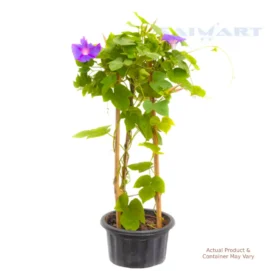- Your cart is empty
- Continue Shopping
Wild Almond Plant
₹80.00 – ₹140.00
| About this product |
| The Wild Almond plant, scientifically known as Prunus dulcis, is a deciduous tree native to the Middle East and South Asia.
It belongs to the Rosaceae family and is closely related to the cultivated almond tree. This medium-sized tree typically reaches a height of 15-30 feet and is characterized by serrated leaves, fragrant white to pale pink flowers, and the production of small, ovoid fruits known as almonds. Alternate Name: Desert almond, Desert peach, Prunus amygdalus, Prunus fasciculata |
| For landscaping & garden renovation services, please contact us |

Product Description
| Plant Overview |
| The Wild Almond plant, scientifically known as Prunus dulcis, is a deciduous tree native to the Middle East and South Asia.
It belongs to the Rosaceae family and is closely related to the cultivated almond tree. This medium-sized tree typically reaches a height of 15-30 feet and is characterized by serrated leaves, fragrant white to pale pink flowers, and the production of small, ovoid fruits known as almonds. Alternate Name: Desert almond, Desert peach, Prunus amygdalus, Prunus fasciculata |
| Plant Benefits |
| Nutrient-Rich Almonds: The Wild Almond tree produces almonds, which are not only a delicious and versatile nut but also a rich source of essential nutrients, including protein, healthy fats, and antioxidants.
Medicinal Properties: Almond extracts from various parts of the plant have been used in traditional medicine for their potential health benefits, such as improving heart health, supporting weight management, and enhancing skin health. Environmental Impact: Wild Almond trees contribute to environmental conservation by preventing soil erosion and supporting biodiversity. Their presence is crucial for sustaining the ecosystems in which they thrive. |
| Plant Care Tips |
| Soil and Watering: Wild Almond plants prefer well-draining soil and moderate watering. Avoid waterlogging to prevent root rot.
Sunlight: Provide full sunlight exposure for optimal growth and fruit production. These trees thrive in sunny conditions. Pruning: Regular pruning helps maintain the shape of the tree, encourages air circulation, and promotes the production of healthy fruits. Fertilization: Feed Wild Almond plants with a balanced fertilizer during the growing season to support their nutritional needs. |
| Ideal Plant Placement |
| Wild Almond plants are best suited for outdoor cultivation in regions with a Mediterranean climate. Plant them in areas with full sunlight exposure, ensuring proper spacing to accommodate their mature size. These trees are an excellent addition to orchards, gardens, or natural landscapes. |
| Significance of This Plant |
| The Wild Almond plant holds cultural significance in various regions due to its historical and economic importance. It has been cultivated for centuries, playing a role in culinary traditions, medicinal practices, and ecosystem sustainability. The almonds produced by this plant have become a staple in many cuisines, symbolizing health and prosperity. |
| FAQs |
|
|
| Disclaimer |
| Every effort is made to maintain accuracy in our product information, yet variations in packaging, information, instruction and materials may occur. We advise against solely relying on the provided details. If a product is unavailable, rest assured that a prompt full-refund will be initiated for the paid amount, ensuring transparency and customer satisfaction in every transaction. |

Additional Information
| Plant Size | Over 1 Feet, Upto 1 Feet |
|---|
Only logged in customers who have purchased this product may leave a review.








Reviews
There are no reviews yet.